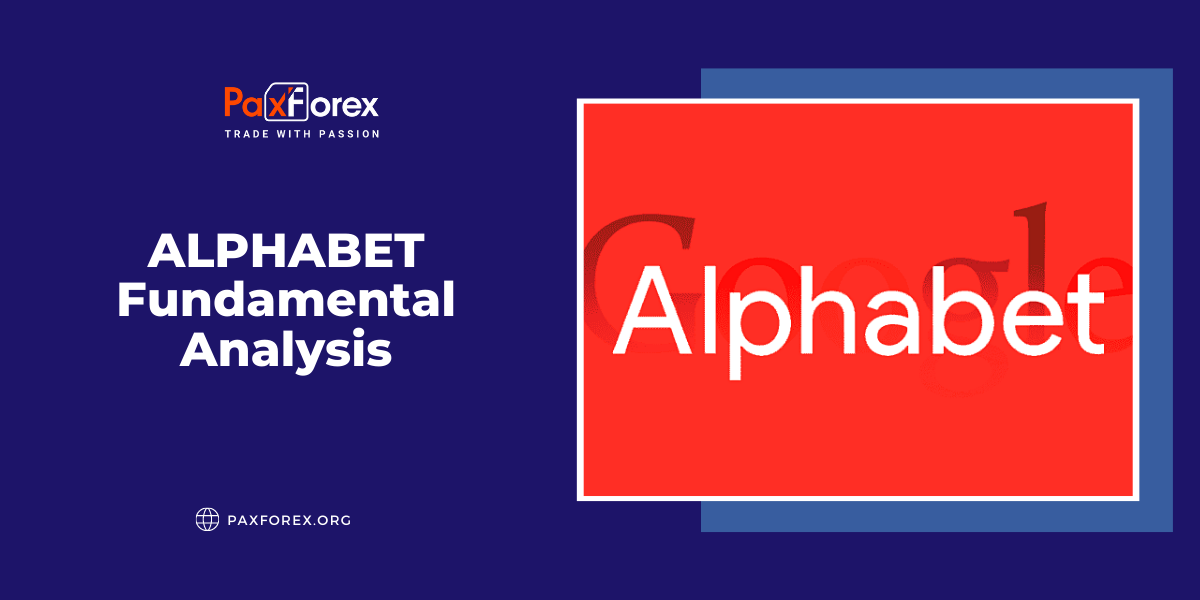
Source: PaxForex Premium Analytics Portal, Fundamental Insight
Alphabet is one of the most closely watched technology companies in the world. Most people probably know that the company owns the world's most popular search engine, a mobile operating system (Android), a Web browser (Chrome), an email service (Gmail), and a streaming video platform (YouTube).
They probably also know that the company gets most of its revenue from Google ads, and it shares a near duopoly in the digital advertising market with Meta Platforms in the U.S. and in many other large markets. Based on these strengths, many investors view Alphabet as a solid long-term investment, capable of recovering from any major economic downturn.
However, Alphabet is also a complex company with many moving parts. So today we're going to look at some little-known facts about the tech giant - and why they might matter to smart long-term investors.
- The previous split was controversial
On July 15, Alphabet will hold a 20-to-1 stock split. This could generate new interest from small retail investors and options traders, since each option contract is tied to 100 shares, and could potentially lead to the company's inclusion in the price-weighted Dow Jones Industrial Average index. For most long-term investors, however, this doesn't make sense, since the company's market value, valuation, and ownership stake would remain the same.
However, Alphabet's previous split in 2014, when the company was still known as Google, caused more controversy. Back then, Google stock was divided into three classes - A, B, and C.
Class A shares, which now trade under the ticker symbol GOOGL, gave investors one vote per share. Class B shares had 10 votes apiece, but they were not publicly traded and were reserved for company founders and top insiders. The Class C shares, now traded under the ticker symbol GOOG, were spun off from the Class A shares in a 2-to-1 split and had no voting rights.
In other words, Google's confusing stock split ensured that any activist action against the company would be unsuccessful without the support of a major Class B shareholder. Alphabet founders Sergey Brin and Larry Page still control 51% of Alphabet's voting shares through their Class B shares, so they could technically challenge or overturn any major decisions made by CEO Sundar Pichai.
- Google is just one of Alphabet's subsidiaries
Google and Alphabet are often used interchangeably because Google accounts for most of Alphabet's revenues, but Google is actually just one of Alphabet's many subsidiaries.
Other Alphabet subsidiaries include autonomous driving company Waymo, drone developer Wing, life sciences companies Calico and Verily, artificial intelligence companies DeepMind and Isomorphic Labs, and a secretive X Development subsidiary focused on experimental projects. The company also operates Google Fiber, a network that provides fiber-optic broadband in select markets, as well as two investment firms.
These barriers were established when Alphabet was founded in 2015 and more clearly separate the company's loss-making experiments from Google's core business.
Alphabet combines these businesses into the "other bets" segment, whose revenue in 2021 rose 15 percent to $753 million - just 0.3 percent of total revenue. However, this segment's operating loss also increased from $4.5 billion to $5.3 billion - compared to a total operating income of $78.7 billion - and is likely to remain a dead weight on Alphabet's operating margin for the foreseeable future.
- Google Cloud is still operating at a loss
Speaking of loss-making business, Google Cloud also continues to chase Amazon Web Services (AWS) and Microsoft Azure in the cloud infrastructure platform market.
According to Canalys, Google Cloud had 8 percent of that market in the first quarter of 2022, ranking third behind AWS (33 percent) and Azure (21 percent). Of the big three, only AWS is profitable.
Google Cloud's 2021 revenues grew 47% to $19.2 billion, accounting for 7% of Alphabet's total revenues. That means it's growing faster than AWS and at a comparable pace to Azure. The segment's operating loss dropped from $3.1 billion to $5.6 billion, but it is likely to remain deeply unprofitable as Google tries to attract more customers with big discounts and aggressive promotions.
These three little-known facts should not make Alphabet a less attractive investment for long-term investors. To be sure, the company has many opportunities to expand its sprawling ecosystem over the next few decades.
But investors should understand that Alphabet's ownership structure still ensures tight control of the company by its founders and insiders and that its loss-making "other bets" and cloud units could significantly slow its revenue growth if Google's advertising business stagnates during the recession.
As long as the price is above 2200.00, follow the recommendations below:
- Time frame: D1
- Recommendation: long position
- Entry point: 2253.29
- Take Profit 1: 2360.00
- Take Profit 2: 2450.00
Alternative scenario:
If the level of 2200.00 is broken-down, follow the recommendations below:
- Time frame: D1
- Recommendation: short position
- Entry point: 2200.00
- Take Profit 1: 2110.00
- Take Profit 2: 2050.00













